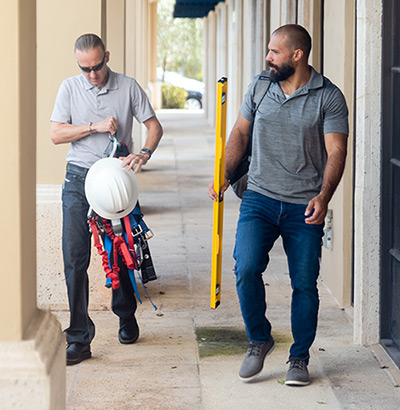Florida Structural Integrity Reserve Study (SIRS) Services
Align with Florida’s latest requirements, maintain safety, and avoid costly surprises.
Maintaining the structural integrity of your property is non-negotiable – not just for compliance with Florida’s latest regulations but for the safety, value, and longevity of your building and everyone living in it. A Structural Integrity Reserve Study (SIRS) provides a comprehensive evaluation of your property’s key systems, identifying potential risks and outlining a clear financial plan to address future maintenance needs. Whether you’re a property owner, condominium association board member, or building manager, Building Mavens delivers expert reserve studies tailored to your specific needs, ensuring your property stays safe, compliant, and prepared for the future.
What is a Structural Integrity Reserve Study (SIRS)?
A Structural Integrity Reserve Study (SIRS) examines the condition of a building’s foundational components – such as concrete systems, roofing, balconies, and electrical infrastructure – to forecast when repairs or replacements will be needed. This process also outlines the funding necessary to address these upcoming maintenance responsibilities. The state of Florida – guided by SIRS Statute 718.112(2)(g) and a desire to never see a disaster like the Surfside, FL condominium collapse – now sets clear benchmarks for SIRS, underscoring the importance of these evaluations for those who own or oversee properties.
The Importance of Structural Integrity Reserve Studies

In Florida, compliance with Structural Integrity Reserve Study (SIRS) requirements is now a legal obligation. Reserve funds designated for SIRS must be used exclusively for related expenses, and updated laws hold board members and officers accountable for meeting their responsibilities. A failure to secure the necessary reports, especially if intentional, is considered a breach of fiduciary duty and may result in personal liability. These legislative changes leave no room for discretion, ensuring that building safety and maintenance remain top priorities for all property owners and boards.
For property owners, condominium association boards, and building managers, a SIRS isn’t just about meeting regulations – it’s a strategic tool for safeguarding structural health and long-term value. Without a clear plan, small maintenance issues can escalate into significant safety hazards and costly repairs. With a detailed SIRS report, you can stay compliant with Florida’s mandates, protect building occupants, and maintain financial stability. A well-executed reserve study empowers you to address potential issues early, preventing emergencies and protecting your property’s future.
How Our SIRS Process Works
At Building Mavens, we apply a proven, step-by-step strategy to deliver a transparent and reliable SIRS report:
- Initial Analysis: We begin by reviewing existing documentation, original plans, and any past inspection records.
- On-Site Evaluation: Our licensed engineers conduct a detailed, hands-on review of critical structural and functional elements, identifying areas of concern or future upkeep.
- Condition Assessment: We estimate the remaining service life of each component, highlight repair priorities, and gauge the expected timeline for replacements.
- Financial Forecasting: Using these insights, we craft a precise funding schedule, helping you budget appropriately for future work so you’re never caught off guard.
- Reporting: We present our findings in a straightforward report, making it easy for property owners, boards, and investors to understand next steps and make informed decisions.
What We Inspect During Your SIRS Inspection

As per Florida state guidelines, the following items are all considered to be related to the structural integrity and safety of the building and must be reserved for. Each is thoroughly inspected by our engineers:
- Roof;
- Structure, including load-bearing walls and other primary structural members and primary structural systems as those terms are defined in §627.706, Fla. Stat.;
- Fireproofing and fire protection systems;
- Plumbing;
- Electrical systems;
- Waterproofing and exterior painting;
- Windows and exterior doors;
- Any other item that has a deferred maintenance expense or replacement cost that exceeds $10,000 and the failure to replace or maintain such item negatively affects the items listed above as determined by the visual inspection portion of the structural integrity reserve study.
Updated laws clarified that items with a remaining useful life of greater than 25 years or more do not require reserves unless specific deferred maintenance costs are identified.
Why OUR CLIENTS CHOOSE US
Take the Next Step: Schedule Your SIRS Report
A SIRS isn’t simply a legal requirement – it’s a smart investment in your property’s future. Ready to protect your building, reassure your residents, and maintain property value? Contact Building Mavens today. We’ll help you schedule an appointment, answer your questions, and deliver the clarity you need for peace of mind and to keep your structure safe and sound for years to come.
Frequently Asked Questions
Passed by the Florida Senate on May 25, 2022, the Building Safety bill primarily addresses mandatory structural inspections and reserves for condominiums and cooperatives with buildings 3 stories or more.
The goal of a healthy condo reserve fund is to ensure that the community has the financial resources to cover the costs of ongoing maintenance and repairs, which helps to protect property values and maintain the quality of life for residents.
Building Mavens recommends that a condo association should aim to have a reserve fund that is at least 70% funded of its total estimated reserve obligations. This means that the reserve fund should be able to cover 70% of the projected cost of all necessary repairs and replacements over the next 30 years.
A Structural Integrity Reserve Study (SIRS) is a study of the reserve funds required for future major repairs and replacement of the common elements based on a visual inspection. The study involves a visual check and estimates how long the roof, load-bearing walls, floors, foundation, fireproofing, fire protection systems, plumbing, and any other major item needing maintenance or replacement (costing over $10,000) can last. It will also estimate the cost to replace these elements. These inspections must be performed by an engineer licensed under chapter 471, an architect licensed under chapter 481, or a person certified as a reserve specialist or professional reserve analyst by the Community Associations Institute or the Association of Professional Reserve Analysts.
In South Florida, environmental factors like hurricanes and humidity can accelerate building wear and tear. A SIRS helps condo associations plan and budget for necessary repairs, enhancing building safety and value. Furthermore, SIRS are now required in Florida for all condominium and cooperative association buildings three stories or more in height. If your association existed before July 1, 2022, your first reserve study must be completed by December 31, 2024. Read more in our recent dedicated SIRS article.
Condominium and cooperative associations must complete a structural integrity reserve study every 10 years for each building in an association that is three stories or higher in height. Florida legislation mandates that condo associations in existence on or before July 1, 2022, complete their initial SIRS by the end of 2024. Subsequent SIRS studies must be conducted every 10 years.
A SIRS evaluation examines critical aspects including (but not limited to):
- The roof.
- The structure itself, such as load-bearing walls and main structural elements, according to the definition in s. 627.706.
- Fireproofing and fire protection systems.
- Plumbing
- Electrical systems.
- Waterproofing and exterior painting.
- Windows and exterior doors.
It also covers any other component that might need more than $10,000 in maintenance or replacement, especially if neglecting it could impact the above areas. This evaluation is based on a visual inspection to help plan for future maintenance and replacements.
By forecasting future repair and replacement costs, a SIRS allows for proactive budgeting and can prevent costly emergency repairs and complications, ensuring a more stable and predictable financial planning process.
A structural integrity reserve study may be performed by any person qualified to perform such study. However, the visual inspection portion of the structural integrity reserve study must be performed or verified by an engineer licensed under chapter 471, an architect licensed under chapter 481, or a person certified as a reserve specialist or professional reserve analyst by the Community Associations Institute or the Association of Professional Reserve Analysts.
The outcome of a structural integrity reserve study is a comprehensive report that includes:
- Identification of each visually inspected item within the condominium property.
- Estimates of the remaining useful life and the replacement cost or deferred maintenance expense for each inspected item.
- A reserve funding schedule proposing an annual reserve amount designed to cover the replacement cost or deferred maintenance expense of each item by the end of its estimated remaining useful life.
Additionally, the study might suggest that no reserves are necessary for items whose useful life and replacement costs cannot be estimated, or it may propose a deferred maintenance expense for these items. For items with an estimated remaining useful life of more than 25 years, the study might recommend not maintaining reserves for replacement costs but could suggest a deferred maintenance expense amount. Learn more in the official statute.
The cost associated with your Structural Integrity Reserve Study can vary widely depending on several factors:
- Size and Complexity of the Property: Larger buildings or complexes with multiple units and facilities may require more extensive evaluations, leading to higher costs.
- Location: Geographic location within Florida can affect costs due to variations in market rates for professional engineering services.
- Scope of the Study: The detailed and depth of the requested analysis will influence the final cost.
- Special Requirements: The need for specialized inspections or assessments, such as those for historic buildings, buildings with unique architectural features, or buildings requiring specialized equipment (e.g., drone inspections), can add to the cost.
Absolutely. By helping property owners, managers, and community associations properly plan their reserve funding, they can be prepared for repairs and replacements in advance and get them in place before serious problems occur. These are especially important for community associations and cooperatives that are responsible for maintenance and repair of common areas and shared amenities. The lack of reserve funds directly contributed to the storied and tragic Surfside collapse.
Under past laws and regulations, Florida condo associations could vote to waive their reserve contributions. In the years since the tragic Surfside condominium collapse, state and local governments have recognized this as a major oversight and have taken proactive steps to enhance building safety legislation significantly. Starting on December 31, 2024, associations may no longer waive their reserve contributions, and maintaining reserves is mandatory for all condominium and cooperative association buildings that are three stories or taller. Read more in our SIRS coverage here.
Yes, with some caveats. For budgets adopted on or after December 31, 2024, for associations required to obtain a structural integrity reserve study, the members can no longer vote to provide no reserves or less reserves for items listed in the study unless the division has approved an alternative funding method. While there’s some flexibility, certain reserves identified as critical in the structural integrity reserve study must be adequately funded according to the study’s recommendations.
These include:
a. Roof.
b. Structure, including load-bearing walls and other primary structural members and primary structural systems as those terms are defined in s. 627.706.
c. Fireproofing and fire protection systems.
d. Plumbing.
e. Electrical systems.
f. Waterproofing and exterior painting.
g. Windows and exterior doors.
h. Any other item that has a deferred maintenance expense or replacement cost that exceeds $10,000 and the failure to replace or maintain such item negatively affects the items listed in sub-subparagraphs a.-g., as determined by the visual inspection portion of the structural integrity reserve study.
Yes, structural integrity reserve studies are mandatory in the state of Florida (s 718.112). Furthermore, failure to obtain a Structural Integrity Reserve Study is a breach of the officers’ and directors’ fiduciary relationship to the unit owners and may lead to personal liability. See our full article on SB 154 for relevant dates and details.
Reserves are funded as part of the annual budget, including accounts for capital expenditures and deferred maintenance for items like roof replacement, building painting, and pavement resurfacing, among others exceeding $10,000 in deferred maintenance expenses or replacement costs. The funding amount is calculated based on the estimated remaining useful life and estimated replacement cost or deferred maintenance expense of each reserve item. For associations required to conduct a structural integrity reserve study, the reserve amount must be based on the study’s findings and recommendations. Additionally, associations can adjust reserve assessments annually to reflect inflation adjustments and any changes in estimates or extensions of the useful life of a reserve item due to deferred maintenance. This structured approach aims to ensure that funds are available for significant repairs and replacements, contributing to the property’s long-term maintenance and value preservation. Read more in section (f) of the s 718.112.
To schedule a structural integrity reserve study, please contact us via our website or by phone. We’ll discuss your specific needs and arrange for an inspection at a time that works best for you.
“I highly recommend Building Mavens. Building Mavens administrative staff and engineers displayed the utmost professionalism throughout the Milestone inspection process. Questions and concerns asked by the Association’s Board of Directors or Management were responded to promptly.”
“Building Mavens has been integral in helping us be on the right track to comply and I know that through the end of our project, they will still be there until we have our final inspection. Their price was reasonable and their service and guidance exceeded expectations. We would use them again should/when further inspections are required.”
“Building Mavens made my project come to life! I have worked with many engineers in the industry, and I must say that the title suits them. They are truly experts in this industry. From the start of my project to the finish, they were there with us every step of the way. I cannot thank them enough and will use them for future projects!”
“Scott and his team were responsive, friendly, and professional. They quickly identified my issue and guided me through the repair process. I would hire them again and recommend them.”
“Top-notch service. Very knowledgable. Definitely recommend!”
“Working with Scott was great. He was extremely responsive and put things in terms I could understand.”
“What an incredible experience I had with Scott and his team! They were extremely professional, provided quality and detailed service, and were a pleasure to work with! I would highly recommend their service.”
“Building Mavens is genuinely an excellent firm! They respond quickly and professionally, and they are indeed experts in the engineering field.”
“Scott gave me more of his time than he had to when helping me. I was grateful to him for putting his expertise to work for me the way he did. That’s rare.”



